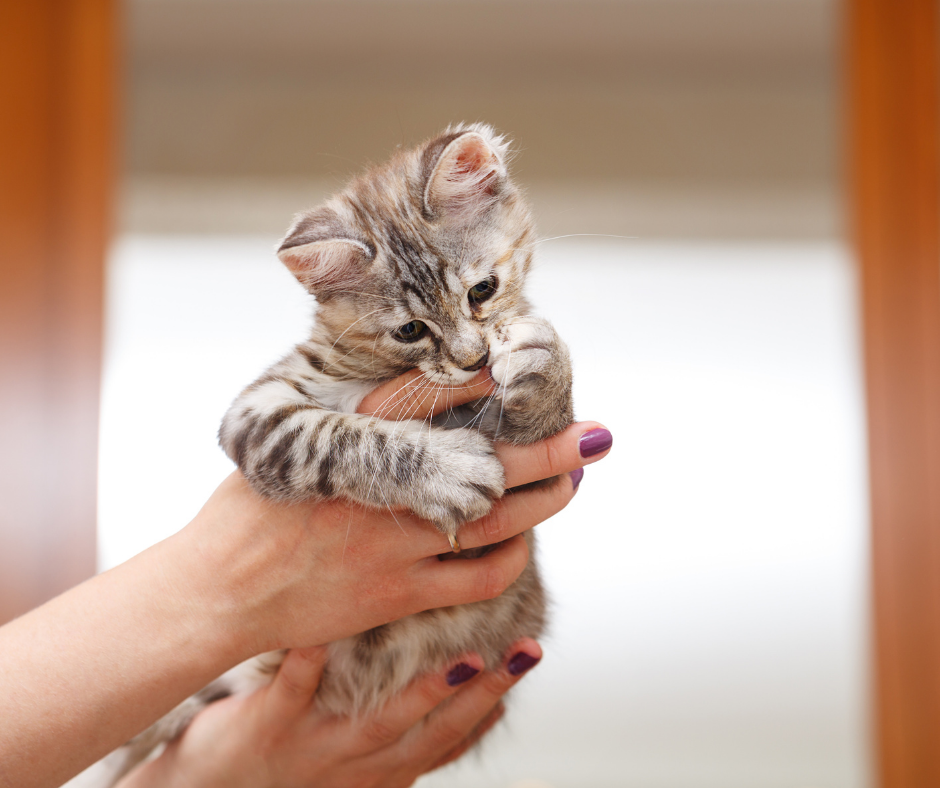Getting a new kitten is always very exciting, but these little furballs are well-known for having lots of sharp and spikey parts. Initially, all kittens will want to run around, play and wrestle, as these are natural behaviours that they would use to practise in preparation for hunting in the wild. However, for domestic felines lots of biting and scratching can be problematic, and even dangerous for owners – leading many pet parents to ask, “what can I do if my kitten keeps biting”. Read on to find out the answer.
Our guide to stopping your kitten scratching and biting
As we’ve discussed, it is very normal for these small creatures to want to scratch and bite, which means that you probably won’t be able to prevent these behaviours completely. However, here are some of our top tips that can help if your kitten keeps biting:

- Try to focus their attention on toys
Your kitten will probably be very tempted to bite your hands (and even your feet!) to play and burn off all their energy. Because of this, it’s a good idea to provide them with plenty of toys as, not only will this be good for their learning and general wellbeing, but it will also divert their attention away from you! You can also hold the soft toys when playing with your kitten as, again, this is a good way to interact with them without getting bitten! That being said, always make sure the toys you select are safe for your cat and avoid string toys or sharp/heavy toys that could be dangerous for them.
- Stop play
Another method is to stop play immediately, so your kitten learns that the fun will stop if they bite or scratch. You can also make a loud noise, for example saying “no”, to further demonstrate they should not bite. Some owners will also leave their kitten alone, without interacting with them, for 5-10 minutes to make it even clearer to them that biting and scratching behaviours will result in them being ignored.
- Make sure your kitten is stimulated and happy
Kittens will inevitably have a lot of steam to burn off, but this energy usually comes in short spurts, so make sure you continually interact and play with your kitten for 10-15 minutes at least three times daily. This will avoid them letting out all their pent-up energy at once – which can sometimes result in more aggressive behaviours. By keeping your kitten occupied more frequently, you will also keep them happier overall.
- Don’t encourage bad behaviour
It’s always very tempting to fuss and cuddle your kitten, but we would advise avoiding doing this if your kitten is biting or scratching. This is because if your kitten associates fuss or playing with biting, this can reinforce the bad behaviour. It can sometimes be helpful to think of kittens in the same way we think of children – if you praise or reward a child for a bad behaviour, they will most likely continue doing it!
- Create a calm and relaxing environment
Worried or anxious kittens will often display defensive behaviours, which often include biting and scratching, so always try and keep your kitten as happy and relaxed as possible. There are lots of ways you can do this, and some examples of things you can do include making sure there are enough food and water bowls, as well as litter trays, if you have a multi-cat household (we would recommend one of these resources for each cat and then one extra – most cats don’t like to share!). It also helps to try to ensure your kitten has a set routine and try to reduce noise and commotion as much as possible. For more tips like these, you can check out our “Introducing a new cat to your home” article here.
That concludes our guide on what you can do if your kitten keeps biting. Want to know more about kittens? Check out our article on “Kitten development stages” here.


